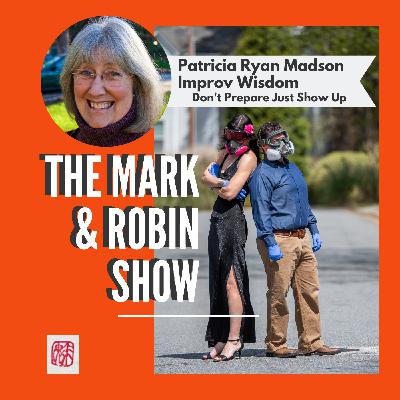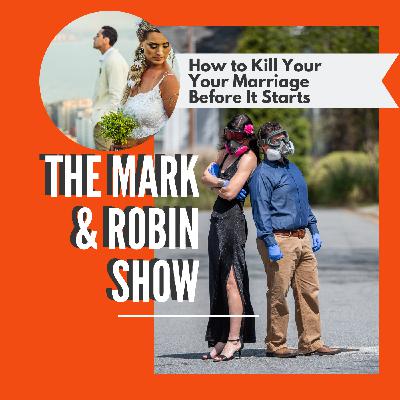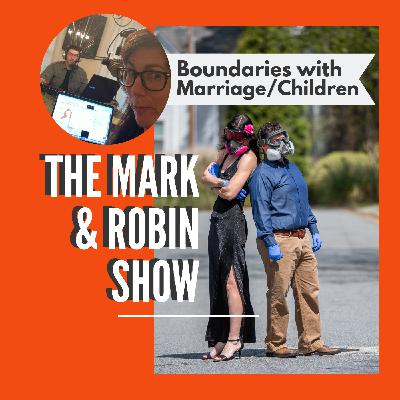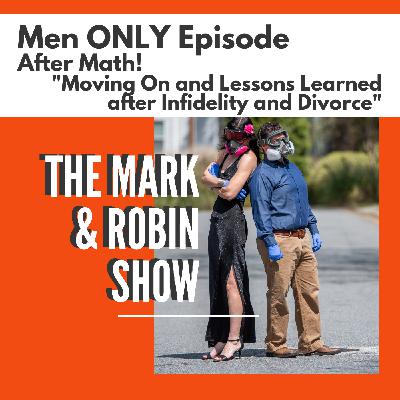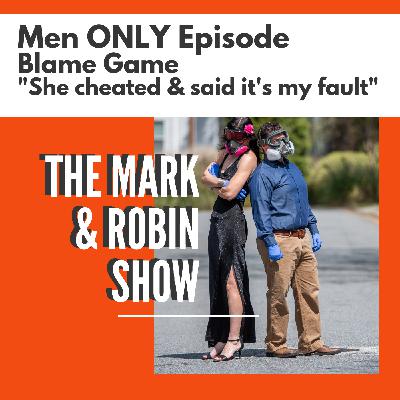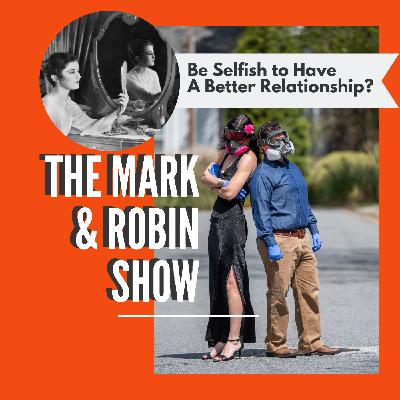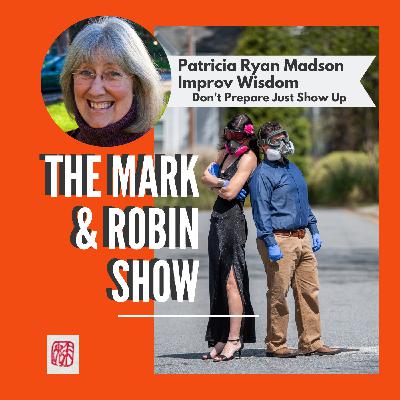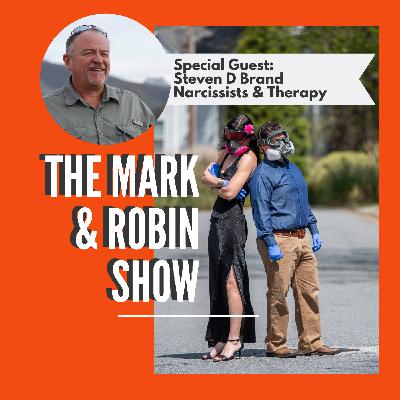The Mark and Robin Show: Patricia Ryan Madson, Improv Author
Description
Patricia Ryan Madson, Author of "Improv Wisdom: Don't Prepare Just Show Up" joins the Mark and Robin Show to discuss how thinking on your feet and enjoying the moment can open doors to life, work and even relationships. So much wisdom! Her 13 Maxims for Life Include: 1. Say Yes, 2. Don't prepare 3. Just Show Up 4. Start anywhere
5. Be average. Great show! You have to listen!
Improv Wisdom: Don't Prepare Just Show Up, has been translated into 9 languages. In 1996 Patricia Ryan Madson founded the Creativity Initiative at Stanford, an interdisciplinary alliance of faculty who share the belief that creativity can be taught.
The Mark and Robin Show is a relationship podcast, exploring how to improve relationships and avoid red flags.
Mark: [00:17 ] All right, here we are with another Mark…
Robin: [00:19 ] And Robin Show.
Mark: [00:20 ] And today, we have an incredibly great magical guest, right Robin?
Robin: [00:25 ] Yes, she's magical. Her name is Patricia Ryan Madson, and Patricia Ryan Madson joins us all the way from California. And she wrote an amazing book called Improv Wisdom: Don't Prepare, Just Show Up. And welcome to the show, Patricia.
Patricia: [00:40 ] Thank you, Robin and Mark. Lovely to be here.
Robin: [00:43 ] We are so glad. And I'd like to just start off by saying the reason I'm so glad that Patricia is joining us today is, I would say, that she's one of the reasons how Mark and I ended up having a friendship and relationship and now a podcast. So it's pretty funny because the book… and that's why I wanted to have you on the show is to talk about how improv in life works. And so can you just give the listening audience the main gist of your book? For me, I know exactly what the sound is when I hear the [ting].
Patricia: [01:14 ] [Ting]
Mark: [01:15 ] Try this.
Patricia: [01:16 ] Try this. Well, the premise of the book is that our life is an improvisation and we're all improvising all the time, even when we try to plan. So why not use some of the rules and the principles that improvisers use when they're trying to study improv for theater and see if these rules don't help open up our options and give us more adventures in our life? And then the book lays out those different rules and how you can try them on and see if they make any difference. And I think the rule that Robin is talking about that brought them together is the cardinal rule. And no matter who you study improv with is the rule of acceptance that you say yes to whatever the premise of the offer is that your partner gives you and you build on that. It doesn't mean you have to like it, but it means you work with it. So you don't reject it or argue. So it's very different from our current political system, for example.
Robin: [02:16 ] Exactly.
Mark: [02:17 ] Indeed.
Robin: [02:17 ] And I would say that it’s almost like social media is a form of communication today, is that people almost want to instantly attack or go against what you say. There's not a lot of agreement, everybody wants to put in their mark on it, which, again, that's awesome.
Mark: [02:24 ] It's true. And talking about social media, there's always the person who, no matter what you say, they're the curmudgeon, they're the “It's my job to be the editor of everybody else, and to step in and disagree and always be the devil's advocate and always say no.”
Robin: [02:54 ] Right. And actually, I think you talk a little bit about that in the chapter I was just listening to earlier this morning is can you talk a little bit about the heart of being critical instantly when an idea comes to you, and what to do with that?
Patricia: [03:07 ] Yeah, I talk about three different lenses or sets of glasses that we put on, and one lens is the critical lens. And if you've ever been involved in higher education, the critical lens is what is prized, and what we really try to cultivate, which is what's wrong with something, how it doesn't work, what are the fallacies in this? And so the critical lens, which I think most people are walking around with is “What's wrong with is this problem, or this day, or this morning, or my coffee, or anything?” And so the critical lens also seems to be something that's high status, academics are sort of famous. When you write a dissertation, you have to, first of all, defend why everybody else is wrong about the thing you're writing about. Anyway, and then the other lens is I call the scientific lens, which is one in which you're supposed to be objective, where you're not critical, you're not favorable, you're supposed to be looking at something realistically - the scientific method. And then I say, the third lens, and the one that I'm going to promote as an improviser is the lens of looking at what's right about the situation, what's good, what's useful, how we're being served.
[04:24 ] A really good example of this right now is we're often, in these days, stuck at home, on calls with customer service people trying to get something solved or some technical issue worked out. And often these people are stressed, they might be sitting in the Philippines, or they're not having a great day. And so it's really easy to get sort of annoyed with the level of customer service.
Mark: [04:55 ] Customer no service.
Patricia: [04:57 ] Right, customer no service. But what I think is really important to see is that despite their attitude, despite any kind of tone in their voice, they are helping us solve the problem. And that what we have to look for is what we're receiving, rather than what we don't like about what we're receiving. And so the improviser always sees what's going on as a gift that they can work with. And just like a real gift, sometimes you open the gift and it's a green sweater, and you hate green, but it's still a gift. And if you look at that as the gift it's intended to be, rather than something you don't like, by changing perspective to put on the lens of looking at the gift, you can really transform your life. I've seen it happen. And I think that's probably the part of the improv story that is maybe most useful, because most of us are interested in ourselves and we’re interested even in relationships of getting what I want, and how the other person is maybe not exactly providing that. I don't know, if you turn that around and just ask, “What am I receiving?”, looking at it [like] “The same husband that annoyed me with something just brought me my coffee, my goodness.” Thank you.
Mark: [06:23 ] Ooh coffee. Coffee is one of Robin’s love languages by the way.
Robin: [06:26 ] It is one of my love languages.
Patricia: [26:28 ] Exactly. So it’s the lens that we look at things from. And I promote, and the improviser has to have the lens of looking at what's right or useful, or what I can do with whatever comes my way. So it's turning around the way the self or the ego interacts. And I think that's probably at the heart of most relationship problems is that “I'm interested in me and getting what I need. But I don't know how interested I am in giving what I can to help my partner.” So that’s like, “Well, of course I give to my partner,” but I think we have to all work on our egos and give them a back seat.
Robin: [07:15 ] Agreed.
Mark: [07:17 ] That's so interesting.
Robin: [17:19 ] Did you have something?
Mark: [07:20 ] Yeah, one thing that when you were talking about that, it just reminded me, because we're all asking the question, “How can I have a more successful joy-filled, great relationships sort of life?” I remember there's an author, Tom Stanley, he wrote a book called The Millionaire Next Door, and one of the things he talked about in his study of millionaires, and then decamillionaires, people who are successful financially is they saw everything that happened to them as a positive thing. Anything that happens to me, the mindset is, “This is good. I can use this to be successful,” whether it's something bad or challenging, or something that most people would consider to be, “Oh, yeah. That's a good thing.” Whether it's good or bad, a successful person sees it as good and “contributing to my success”.
Robin: [08:14 ] Yeah.
Patricia: [08:14 ] That's exactly the secret. There's a little improv game where we give each other imaginary gifts and you have to have to say to the gift, “Oh, good. I needed that,” and then put why you needed it. It’s the same thing about the millionaires, “Oh, good. I needed that cancer diagnosis because, during this time when I've been taking chemo, I was able to” yadda yadda, because we can all find the lemons and the lemonade--
Robin: [08:44 ] Especially if you have a teenager.
Patricia: [08:46 ] Right. But it's not our first response. I think our first response is often the negative. And so the millionaire is right that if you take everything that comes your way as something that you can use, doesn't mean you have to like it, but how can you take these things t

